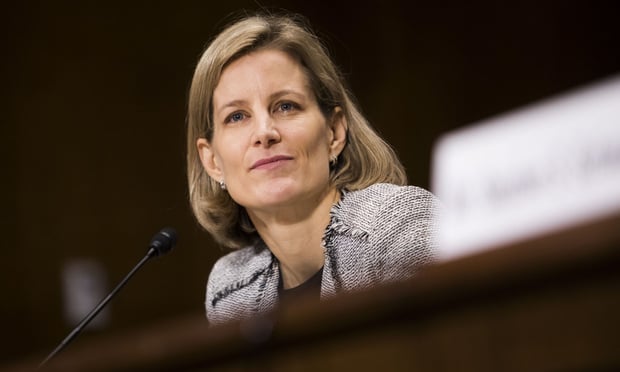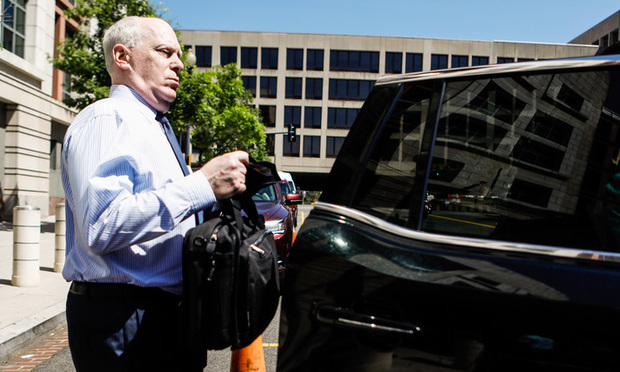'Putin's Chef'? Jury Should Hear Nicknames in Russia Case, Prosecutors Argue
The government and private lawyers for an indicted Russian outfit are sparring over the contours of an upcoming trial in Washington's federal trial court.
January 22, 2020 at 01:11 PM
6 minute read
 U.S. District Judge Dabney Friedrich in July 2017 at her confirmation hearing in the Senate Judiciary Committee. Photo: Diego M. Radzinschi / National Law Journal
U.S. District Judge Dabney Friedrich in July 2017 at her confirmation hearing in the Senate Judiciary Committee. Photo: Diego M. Radzinschi / National Law Journal
Jurors should be allowed to hear a businessman's nickname, "Putin's chef," at an upcoming trial involving allegations that Russian companies and individuals fraudulently used social media accounts to sow discord in the U.S. electorate leading up to the 2016 presidential election, federal prosecutors said in a court filing Wednesday.
That nickname is attached in U.S. and Russian media reports to Yevgeny Prigozhin, a businessman whom prosecutors have identified as the controlling officer of a Russian company called Concord Management and Consulting. Prosecutors in Washington charged Concord, Prigozhin and a dozen others in a wide-ranging case accusing Russians of posing as Americans on Twitter and Facebook and purchasing advertisements on social media with the goal of influencing the election in favor of President Donald Trump.
Wednesday's court filing came amid a clash over what evidence should be allowed at Concord Management's trial, which is slated to begin in April. U.S. District Judge Dabney Friedrich of the District of Columbia, a 2017 appointee to Washington's federal district court, is set to meet with the attorneys Friday in court, and she can be expected in coming weeks to issue rulings that will shape the contours of the trial. Friedrich earlier refused to dismiss the indictment.
Lawyers for Concord Management, represented by Reed Smith, broadly contend any use of nicknames at trial would be unfairly prejudicial in linking the company to the Kremlin. They argue the nicknames "Putin's chef" and "Putin's cook" are purely media-driven and inadmissible.
"Reference to these monikers and evidence of the same should be excluded at trial because it is irrelevant, and improperly and implicitly links Concord to Vladmir Putin and the Russian government, which would be unduly prejudicial to Concord," Reed Smith partner Eric Dubelier argued in a court filing.
Prigozhin, whose restaurants and catering businesses gave rise to his nickname, has figured prominently in the case, even as he has refused to appear in U.S. court. Prosecutors contend he approved and financed the activities of the Internet Research Agency, the Russian outfit at the center of the alleged social media conspiracy.
"The government intends to introduce limited evidence regarding Prigozhin's various nicknames for the purpose of connecting Prigozhin to the activities of the Internet Research Agency (IRA)," prosecutors said in their new court filing.
Concord Management is so far the only Russian defendant in the case to answer to the charges in the U.S. District Court for the District of Columbia. Ever since the charges were filed in 2018, prosecutors have sparred with Concord Management's lead defense lawyer, Dubelier, who has argued the government has charged the Russian firm with a "make-believe crime."
Concord Management's case has posed challenges distinct from other prosecutions rooted in former Special Counsel Robert Mueller III's investigation of Russia's interference in the 2016 presidential election.
Those other cases have involved allegations against U.S.-based individuals of illegal lobbying, financial fraud and making false statements—either to Congress or federal investigators. Prosecutors secured convictions or guilty pleas from an array of people in Trump's world, including his former Trump campaign chairman Paul Manafort and his longtime business partner Rick Gates; Roger Stone, a longtime Trump confidante; and Michael Flynn, formerly Trump's national security adviser. Flynn, who faces sentencing next month, is trying to withdraw his guilty plea.
The case against the Russian defendants has opened the U.S. government up to discovery touching on sensitive national security information. Friedrich put restrictions on the defense team's ability to share sensitive information kicked up in discovery, requiring that materials be kept "in a locked room at Reed Smith's offices" and not be stored on any device connected to the internet.
In their filing Wednesday, prosecutors redacted the evidence they said they intend to introduce with respect to the monikers "Putin's chef" and "Putin's cook." The prosecution team includes Heather Alpino of the Justice Department's national security division and assistant U.S. attorneys Luke Jones, Peter Lallas and Jonathan Kravis.
"The government does not intend to introduce any evidence that Vladimir Putin directed the actions of the conspirators or evidence connecting Prigozhin to Putin other than Prigozhin's nickname," prosecutors said in Wednesday's filing.
The government said it also wants to show jurors various Facebook and Twitter accounts associated with the alleged conspiracy.
The accounts, including "March for Trump" and "Secured Borders," the government said, were "all related to the conspirators' overarching goal of sowing discord in the American political system and favoring one candidate over another." The government has alleged the social media accounts were used "to post politically and social incendiary messages."
 Eric Dubelier of Reed Smith exits federal court in Washington, D.C., on June 15, 2018. Photo: Diego M. Radzinschi / National Law Journal
Eric Dubelier of Reed Smith exits federal court in Washington, D.C., on June 15, 2018. Photo: Diego M. Radzinschi / National Law JournalConcord Management's lawyers at Reed Smith, including Dubelier and Katherine Seikaly, urged Friedrich earlier this month to limit the information prosecutors can show to jurors. "The use of these nicknames is completely avoidable because they appear only in media reports, which are, in any case, inadmissible," Dubelier argued.
The Reed Smith team argued the identification of the defendants in the case "is not a concern" and so there's no reason the government needs to use any nickname.
"Mr. Prigozhin is the only defendant named in the Indictment with the surname Prigozhin. And to the extent that there are any other individuals named Prigozhin that are relevant to this case (Concord is not aware of any), the government could easily distinguish them by using Mr. Prigozhin's first name, Yevgeniy," Dubelier wrote.
One designation the government said it does not intend to use with respect to Prigozhin: "oligarch."
Read more:
'We're Now on a Trial Track.' Judge Pushes End-Game in Russian 'Troll Farm' Case
Judge Warns Prosecutors About Public Statements in Case Against Russian Firm
'Knock It Off': Judge Upbraids Reed Smith Partner Litigating Mueller Case
How Law Firms Are Protecting Sensitive Information in Russia Cases
Reed Smith Bolsters Readiness in Russia Case, Adding Appellate Duo
This content has been archived. It is available through our partners, LexisNexis® and Bloomberg Law.
To view this content, please continue to their sites.
Not a Lexis Subscriber?
Subscribe Now
Not a Bloomberg Law Subscriber?
Subscribe Now
NOT FOR REPRINT
© 2025 ALM Global, LLC, All Rights Reserved. Request academic re-use from www.copyright.com. All other uses, submit a request to [email protected]. For more information visit Asset & Logo Licensing.
You Might Like
View All
Trump Fires EEOC Commissioners, Kneecapping Democrat-Controlled Civil Rights Agency

Federal Judge Pauses Trump Funding Freeze as Democratic AGs Plan Suit
4 minute read
Testing Legal Authority, Trump Fires NLRB Member, Leaving Panel Without Quorum
3 minute read
Trending Stories
- 1Robinson & Cole Adds to Immigration Team in Philly
- 2DC Circuit Revives Firefighters' Religious Freedom Litigation in Facial Hair Policy Row
- 3‘High Demand’: Former Trump Admin Lawyers Leverage Connections for Big Law Work, Jobs
- 4Considerations for Establishing or Denying a Texas Partnership to Invest in Real Estate
- 5In-House AI Adoption Stalls Despite Rising Business Pressures
Who Got The Work
J. Brugh Lower of Gibbons has entered an appearance for industrial equipment supplier Devco Corporation in a pending trademark infringement lawsuit. The suit, accusing the defendant of selling knock-off Graco products, was filed Dec. 18 in New Jersey District Court by Rivkin Radler on behalf of Graco Inc. and Graco Minnesota. The case, assigned to U.S. District Judge Zahid N. Quraishi, is 3:24-cv-11294, Graco Inc. et al v. Devco Corporation.
Who Got The Work
Rebecca Maller-Stein and Kent A. Yalowitz of Arnold & Porter Kaye Scholer have entered their appearances for Hanaco Venture Capital and its executives, Lior Prosor and David Frankel, in a pending securities lawsuit. The action, filed on Dec. 24 in New York Southern District Court by Zell, Aron & Co. on behalf of Goldeneye Advisors, accuses the defendants of negligently and fraudulently managing the plaintiff's $1 million investment. The case, assigned to U.S. District Judge Vernon S. Broderick, is 1:24-cv-09918, Goldeneye Advisors, LLC v. Hanaco Venture Capital, Ltd. et al.
Who Got The Work
Attorneys from A&O Shearman has stepped in as defense counsel for Toronto-Dominion Bank and other defendants in a pending securities class action. The suit, filed Dec. 11 in New York Southern District Court by Bleichmar Fonti & Auld, accuses the defendants of concealing the bank's 'pervasive' deficiencies in regards to its compliance with the Bank Secrecy Act and the quality of its anti-money laundering controls. The case, assigned to U.S. District Judge Arun Subramanian, is 1:24-cv-09445, Gonzalez v. The Toronto-Dominion Bank et al.
Who Got The Work
Crown Castle International, a Pennsylvania company providing shared communications infrastructure, has turned to Luke D. Wolf of Gordon Rees Scully Mansukhani to fend off a pending breach-of-contract lawsuit. The court action, filed Nov. 25 in Michigan Eastern District Court by Hooper Hathaway PC on behalf of The Town Residences LLC, accuses Crown Castle of failing to transfer approximately $30,000 in utility payments from T-Mobile in breach of a roof-top lease and assignment agreement. The case, assigned to U.S. District Judge Susan K. Declercq, is 2:24-cv-13131, The Town Residences LLC v. T-Mobile US, Inc. et al.
Who Got The Work
Wilfred P. Coronato and Daniel M. Schwartz of McCarter & English have stepped in as defense counsel to Electrolux Home Products Inc. in a pending product liability lawsuit. The court action, filed Nov. 26 in New York Eastern District Court by Poulos Lopiccolo PC and Nagel Rice LLP on behalf of David Stern, alleges that the defendant's refrigerators’ drawers and shelving repeatedly break and fall apart within months after purchase. The case, assigned to U.S. District Judge Joan M. Azrack, is 2:24-cv-08204, Stern v. Electrolux Home Products, Inc.
Featured Firms
Law Offices of Gary Martin Hays & Associates, P.C.
(470) 294-1674
Law Offices of Mark E. Salomone
(857) 444-6468
Smith & Hassler
(713) 739-1250








